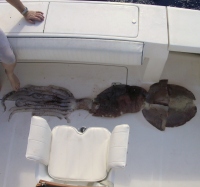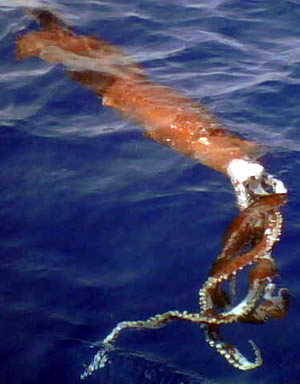Six-foot squid found in Cayman waters
 (CNS): A very rare deep water squid, discovered by fishermen off the coast of Grand Cayman last month, is the same species, Asperoteuthis acanthoderma, as the specimen recovered off the coast of Little Cayman last year and one of only five of this species found in Atlantic waters so far. The latest find measured more than 6 feet in length (slightly less than the 24lbs 4oz creature found off Little Cayman in May 2008, which was over 7 feet long). It was discovered on Sunday, 27 September, by Dennis Denton, Stuart Mailer, and M. Christine RoseSmyth-Mailer. Photo by M. Christine RoseSmyth-Mailer
(CNS): A very rare deep water squid, discovered by fishermen off the coast of Grand Cayman last month, is the same species, Asperoteuthis acanthoderma, as the specimen recovered off the coast of Little Cayman last year and one of only five of this species found in Atlantic waters so far. The latest find measured more than 6 feet in length (slightly less than the 24lbs 4oz creature found off Little Cayman in May 2008, which was over 7 feet long). It was discovered on Sunday, 27 September, by Dennis Denton, Stuart Mailer, and M. Christine RoseSmyth-Mailer. Photo by M. Christine RoseSmyth-Mailer
According to Denton they were trolling along a weed line about 1½ miles north of the Rum Point channel when they noticed something in the water ahead of them. “As we went passed we realised it was a large squid, apparently dead, floating just below the surface.”
Recognising the scientific importance of this sighting, Denton marked the location with a GPS and brought in the fishing lines to have a closer look. He explained, “The animal was intact and much larger than we had thought so it was brought on board for better inspection and photographs.” After a call was made to the Department of Environment (DoE) confirming their interest in examining the squid further, it was placed in plastic bags, put on ice, and brought to shore.
 DoE Deputy Director for Research and Assessment Timothy Austin and Research Officer Janice Blumenthal collected the squid from Denton, took DNA samples and preserved the specimen. They then contacted cephalopod experts at the Smithsonian Institution, Mote Marine Laboratory, and the University of South Florida’s College of Marine Science to report the discovery. According to Dr. Heather Judkins, a cephalopod expert at the University of South Florida, the squid appears to be Asperoteuthis acanthoderma – a little-known deep sea dwelling species. (Right: Little Cayman squid, photo by Jose Williams, 2008)
DoE Deputy Director for Research and Assessment Timothy Austin and Research Officer Janice Blumenthal collected the squid from Denton, took DNA samples and preserved the specimen. They then contacted cephalopod experts at the Smithsonian Institution, Mote Marine Laboratory, and the University of South Florida’s College of Marine Science to report the discovery. According to Dr. Heather Judkins, a cephalopod expert at the University of South Florida, the squid appears to be Asperoteuthis acanthoderma – a little-known deep sea dwelling species. (Right: Little Cayman squid, photo by Jose Williams, 2008)
DoE’s Dr Blumenthal said “We were told that this squid is only the fifth animal of the species ever documented in the Atlantic Ocean, and it is in very good condition. Cephalopod experts such as Dr Judkins and Dr Clyde Roper at the Smithsonian Institution have expressed great interest in examining and dissecting the specimen.”
Dr Judkins explained that closer examination of the specimen and analysis of DNA samples would be used to confirm the identity of the species, and added, “Since this is a deep sea squid, almost everything is fair game for future study. We haven’t seen a male specimen yet for this region and to learn anything about their biology, ecology, and habitat would be extremely interesting to discover.”
Of the previous Asperoteuthis acanthoderma specimens, a handful have been documented in the Pacific Ocean but prior to 2006 none had ever been found in the Atlantic. Then during a ten month period between 2006 and 2007 four specimens were discovered – two recovered off the Florida Keys, one photographed near Grand Cayman, and one recovered near Little Cayman. Experts are still unsure why the species had never been seen in the Atlantic before 2006 and why four specimens were then found in such a short period.
Dr Judkins explained that discoveries might be due to fishermen now recognising the importance of reporting giant squid sightings to scientists, and that topography of the ocean floor might also play a role: in the Florida Keys and the Cayman Islands, she said, “there is a geological bump of sorts where the depth of the water goes from deep to shallow rather quickly and that may be bringing the squid closer to the surface.”
She continued, “There has been in-depth research done in the Broad Caribbean since the 1950s and to find a new large species shows us how little we have actually studied of the deeper waters of the Broad Caribbean. It shows that more fieldwork is needed and it can be a great benefit to cephalopod research.”
The Little Cayman squid was found May 2008 floating on the surface of the ocean about 5 miles south of Little Cayman by local fisherman Derren Burlington, who was taking part in the Brac Jackpot Fishing Tournament. It was transported to the Little Cayman Research Centre operated by the Central Caribbean Marine Institute (CCMI), where it was preserved and then shipped to the US.
Regarding the specimens collected in the Cayman Islands, Dr. Blumenthal said: “Clearly, there is much that is unknown regarding the oceanic animals that inhabit and move through Cayman waters – including deep water squid and their predators such as beaked whales and sperm whales.”
In November 2009, the Save Our Seas Foundation will carry out an OTEP funded project with the DoE to survey the waters surrounding the Cayman Islands for marine mammals, as well as sharks and rays. DoE officials also ask members of the public who spot large sea creatures (such as dolphins, whales, sharks, manta rays, adult turtles > 3 ft shell length, and of course giant squid) to make a report to the DoE marine sightings database by calling 949-8469 or emailing DoE@gov.ky.
Category: Science and Nature


I hope an autopsy was performed, this may well simply be an unmanned spy drone sent by H.M. to keep an eye on the progress of the destabalisation project
I have to agree with the post from Andrew…it is so refreshing to learn about interesting things like these. This is one of my favorite sections of the news reported by CNS.
I have been trying to find an update on a story about a species of Sloth considered to be extinct ( known from the dinosaur age) that was recently found in a latin american country I believe- Discovered by some young boys who were scared and apparently stoned the animal to death – CNS do you think you could find any details on this?
Thanks
Faithful reader
CNS: I think you could be getting two stories muddled. There’s this and this.
Well… enough with the news
CAN WE EAT THEM???
Excellent article CNS, well written and investigated, can we please have more of this sort of news, it’s such a pleasant change to read something other than the current political nonsence.
CNS: Most of this article came from GIS, which I forgot to note (sorry GIS). You should check out our Science and Nature section for more of these sort of articles. (Place the cursor over "News" on the main menu)
Now that’s a whole bunch of calamari for yah!..
They’re Coming!!! and those are just the babies!!!